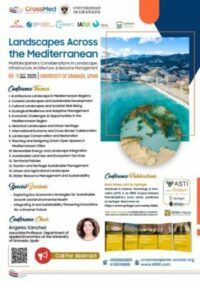ISSN (online): 2076-3298
Call of the Journal:
- Dynamic of Vegetation and Climate Change
- Environmental Implications of COVID-19 Pandemic
- Environmental Sustainability – Life Cycle Assessment – Energy and Environmental Technology
- Groundwater Quality and Groundwater Vulnerability Assessment
- Indoor and Outdoor Air Particulate Matter
- Monitoring and Assessment of Environmental Quality in Coastal Ecosystems
- Monitoring and Management of Inland Waters
- Multiple Approaches for Environmental Assessment of Transitional and Coastal Waters
- Plastic Contamination | Challenges and Solutions
- Response to Current Air Quality Changes in Small and Large Areas
- Restorative Agriculture
- Risk Assessment for Workplace Exposure to Natural Radioactivity
- Rural-Urban Relations and Sustainable Food Systems
- Soil Pollution Assessment and Sustainable Remediation Strategies
Apr
2021
Plastics are popular synthetic materials due to their advantageous properties, such as low density and high durability, which have led to their increased use in multiple applications. Either in larger or smaller sizes, known as microplastics and nanoplastics, plastics are continuously released to the environment, where they accumulate due to their resistance to degradation. For this reason, plastics now contaminate virtually every ecosystem on the planet, being considered a marker for the Anthropocene. The accumulation of plastics in the environment can have negative effects on organisms and ecosystems directly through toxicity, or indirectly through habitat changes. Most of this contamination originates from an unsustainable use and management of plastics, from production to consumption and disposal, which needs to be restructured in the context of a circular economy. This Special Issue invites novel contributions in the form of critical reviews and research papers to address all aspects of plastics, such as: (i) strategies or technologies to improve the production, use, and waste management of plastics; (ii) analytical methods for the assessment of micro/nanoplastics; (iii) concentrations and characteristics of micro/nanoplastics in the environment; (iv) ecotoxicological or abiotic effects of micro/nanoplastics; (v) the role of micro/nanoplastics as vectors of contaminants and pathogens. This Special Issue also welcomes contributions regarding changes in plastics policies, consumption, incorrect disposal, and waste management during the Covid-19 pandemic.
Keywords: plastics; plastic pollution; microplastics; nanoplastics; waste management; mitigation strategies; ecotoxicology; human health.
Plastic Contamination | Challenges and Solutions
Plastics are popular synthetic materials due to their advantageous properties, such as low density and high durability, which have led to their increased use in multiple applications. Either in larger or smaller sizes, known as microplastics and nanoplastics, plastics are continuously released to the environment, where they accumulate due to their resistance to degradation. For this reason, plastics now contaminate virtually every ecosystem on the planet, being considered a marker for the Anthropocene. The accumulation of plastics in the environment can have negative effects on organisms and ecosystems directly through toxicity, or indirectly through habitat changes. Most of this contamination originates from an unsustainable use and management of plastics, from production to consumption and disposal, which needs to be restructured in the context of a circular economy. This Special Issue invites novel contributions in the form of critical reviews and research papers to address all aspects of plastics, such as: (i) strategies or technologies to improve the production, use, and waste management of plastics; (ii) analytical methods for the assessment of micro/nanoplastics; (iii) concentrations and characteristics of micro/nanoplastics in the environment; (iv) ecotoxicological or abiotic effects of micro/nanoplastics; (v) the role of micro/nanoplastics as vectors of contaminants and pathogens. This Special Issue also welcomes contributions regarding changes in plastics policies, consumption, incorrect disposal, and waste management during the Covid-19 pandemic.
Keywords: plastics; plastic pollution; microplastics; nanoplastics; waste management; mitigation strategies; ecotoxicology; human health.
AGRICOLA (National Agricultural Library), AGRIS Agricultural Sciences and Technology (FAO), DOAJ, Emerging Sources Citation Index – Web of Science (Clarivate Analytics), Genamics JournalSeek, GeoRef (American Geosciences Institute),Norwegian Register for Scientific Journals, Series and Publishers (NSD), Scopus (Elsevier) Web of Science (Clarivate Analytics), CLOCKSS (Digital Archive), e-Helvetica (Swiss National Library Digital Archive), Academic OneFile (Gale/Cengage Learning), Google Scholar J-Gate (Informatics India), ProQuest Central (ProQuest), Science In Context (Gale/Cengage Learning), WorldCat (OCLC).
Info at: www.mdpi.com/journal/environments/apc
Guest Editors
Dr. Teresa A. P. Rocha-Santos
Dr. Joana C. Prata










